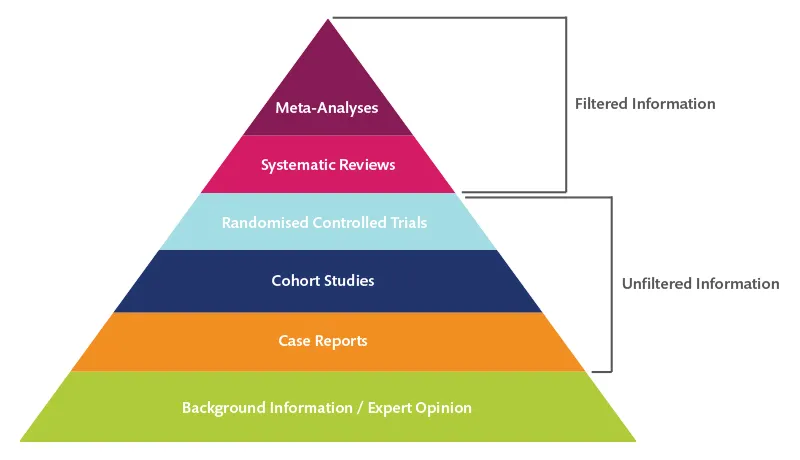The importance of evidence-based policy and practice

Image Source: Karolinska Institute – visualisation of the hierarchy of evidence
A blog post by Jessica Greenhalgh, Research Project Administrator, DRNS
Evidence-based policy and practice utilises research, clinical experiences, and patient preferences to provide health and social care professionals, educators, and policy makers with the best available knowledge about specific treatments, social interventions, and many other areas. The DRNS was created to help produce high quality evidence that will meet the needs of people affected by drug use as well as frontline service providers and clinicians. We place high value on its use to inform drug policy and practice implementation.
The use of evidence-based practice and policies introduces confirmed knowledge of effective, and ineffective, treatments and interventions that are measured and evaluated using robust and objective methods. It is not solely academic research that can create ‘evidence-bases’, the image below highlights the ‘hierarchy of research’, detailing what is typically considered ‘evidence’ in evidence-based practice.
The above hierarchy focuses on quantitative research. However robust and well-designed qualitative research also plays an important role within evidence-based policy and practice. Evidence is made up of both quantitative and qualitative research. Quantitative research can tell us what interventions (medications, psychosocial interventions etc.) work for a particular population, whereas qualitative research provides insights into people’s experiences, for example, of these interventions and their perceptions of why they work (or don’t!). Qualitative research is also beneficial in accessing ‘hidden’ or ‘hard-to-reach’ groups, which is particularly important in the drugs field (see Neale et al. 2005). There is also a growing recognition of the value of combining quantitative and qualitative research in ‘mixed methods’ studies, for example to understand the experiences of those involved in a Randomised Controlled Trial (see O’Cathian et al. 2013). The evidence base can also change over time as new research is conducted and we become aware of new methods and approaches. An example of this could be the increase in realist reviews as evidence. These reviews can provide more detail on why a treatment works (or doesn’t), with whom and where. Realist reviews can provide ‘real world’ insights (see Rycroft-Malone et al. 2012).
The large number of evidence-based treatments and interventions available can support each individual to access the most appropriate service for their own situation. Evidence helps to:
- identify effective interventions based on multiple studies completed by a number of researchers rather than subjective interpretations;
- provide the most effective care, treatment or support that is available;
- improve patient outcomes;
- ensure health resources are used in the most effective way, considering all relevant evidence when decisions are made about funding health services;
- relieve the ever-growing pressures on problem drug use support services/treatment centres through focusing resources on the most effective treatments;
- understand barriers/facilitators to accessing treatment (e.g. qualitative research informing service delivery).
With the increased use of social media and online web forums, there is often a vast amount of misinformation available to potential service users informing them of ineffective treatments or treatments with little to no evidence behind them. There is a danger that this misinformation will take away from the evidence-based treatments and interventions available due to a disbelief in their effectiveness and lack of trust in traditional research. At worst, investment in non-evidence based approaches, or scare mongering regarding effective approaches, might actually cause more harm.
Evidence is more than just ‘scientific’ research (i.e. quantitative), it is also based on well-designed, high quality qualitative research, where sampling, and process issues such as the positioning of the researcher, is carefully considered. This is research which provides valuable insight into the views and experiences of various people affected i.e., practitioners, individuals seeking assistance and treatment, their families and communities. Accessing good quality, peer reviewed journals is a good first step in identifying high quality research. Look for papers which are transparent in the methods they used. Look at the references of these papers to see what other work has informed the research.
Below are a number of websites and publications which highlight the importance and advantages of using evidence, as well as some of the risks associated with the spread of misinformation.
DRNS is hosting a series of blogs on evidence. If you want to contribute please contact admin@drns.ac.uk
Websites
Cochrane (2021): Trusted evidence, informed decisions, better health.
World Health Organisation (2021): Forum for tackling misinformation on health and non-communicable diseases.
Cochrane (2020): Cochrane handbook for systematic reviews of interventions.
Wellcome (2020): Supporting the use of research evidence in policy and practice.
British Medical Journal Best Practice (2019): Why do we need evidence-based medicine?
London School for Economics and Political Science (2019): Does evidence still matter? 10 strands of continuity and change in evidence based policy and practice.
Northern Ireland Assembly (2016): Knowledge exchange seminar series overview: Making better use of evidence in public policy making.
National Centre for Mental Health and Juvenile Justice (2015): Implementing evidence-based practices.
Publications
Kneale, D., Rojas-Garcia, A., & Thomas, J. (2019). Obstacles and opportunities to using research evidence in local public health decision-making in England. Health Research Policy and Systems, 17(61). Available here.
Babor, T.F., Caulkins, J., Fischer, B., Foxcroft, D., Medina-Mora, M.E., Obot, I., et al. (2019). Drug policy and the public good: A summary of the second edition. Addiction, 114(11), 1941-1950. Available here.
Babor, T.F., Caulkins, J., Fischer, B., Foxcroft, D., Medina-Mora, M.E., Obot, I., et al. (2018). Drug Policy and the Public Good. (2nd Eds). Oxford University Press. Available here.
Arndt, S., & Jones, D. (2018). Preventing sensationalistic science and fake news about substance use. Substance Abuse Treatment, Prevention and Policy, 11. Available here.
Department of Health and Social Care. (2017). Drug misuse and dependence: UK guidelines on clinical management. Clinical guidelines on drug misuse and dependence update 2017 Independent Expert Working Group. Available here.
Organisation for Economic Co-operation and Development. (2017). Governing better through evidence-informed policy making. Conference summary. Available here.
Kothari, A., McPherson, C., Gore, D., Cohen, B., MacDonald, M., & Sibbald, S.L. (2016). A multiple case study of intersectoral public health networks: Experiences and benefits of using research. Health Research Policy and Systems, 14(11). Available here.
O’Cathian, A., Thomas, K.J., Drabble, S.J., Rudolph, A., & Hewison, J. (2013). What can qualitative research do for randomised controlled trials? A systematic mapping review. British Medical Journal Open, 3. Available here.
Rycroft-Malone, J., McCormack, B., Hutchinson, A.M., DeCorby, K., Bucknall, T.K., et al. (2012). Realist synthesis: Illustrating the method for implementation research. Implementation Science, 7(33). Available here.
Collins, E., & Daly, E. (2011). Decision making and social work in Scotland: The role of evidence and practice wisdom. Organisation report. Available here.
National Endowment for Science, Technology and the Arts. (2011). Using evidence to improve social policy and practice: Perspectives on how research and evidence can influence decision making. Alliance for Useful Evidence. Available here.
Facey, K., Boivin, A., Gracia, J., Hansen, H.P., Lo Scalzo, A., et al. (2010). Patients’ perspectives in health technology assessment: A route to robust evidence and fair deliberation. International Journal of Technology Assessment in Health Care, 26(3), 334-340. Available here.
Steenrod, S. (2009). A functional guide to the evidence-based practice movement in the substance abuse treatment field. Journal of Social Work Practice in the Addictions, 9, 353-365. Available here.
Neale, J., Allen, D., & Coombes, L. (2005). Qualitative research methods within the addictions. Addiction, 100(11), 1584-1593. Available here.




